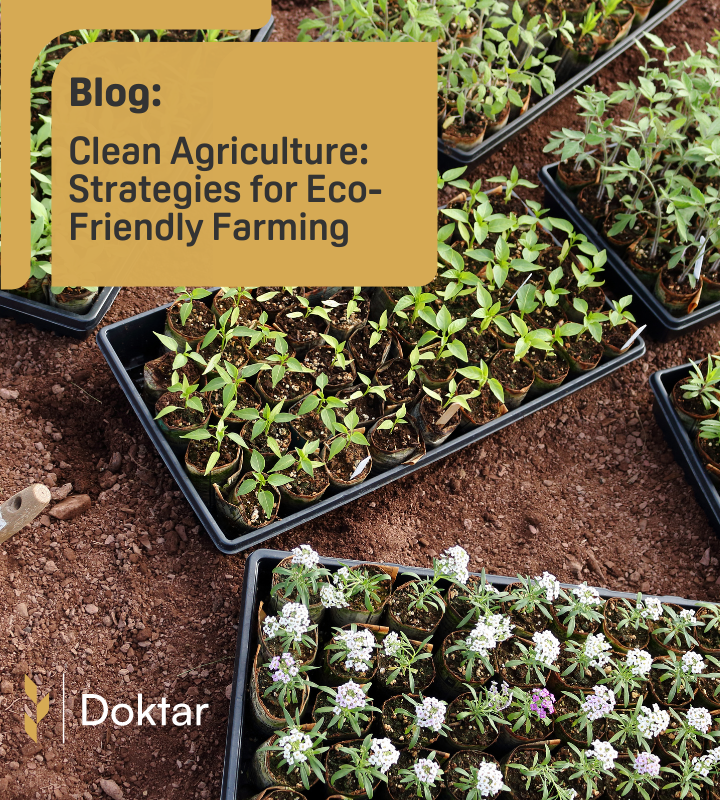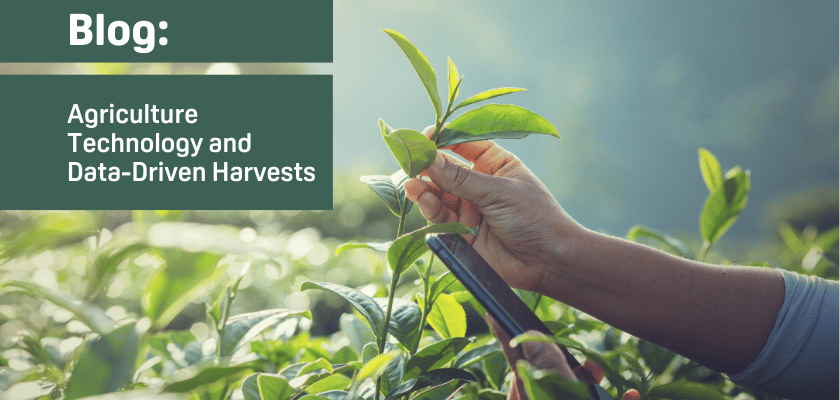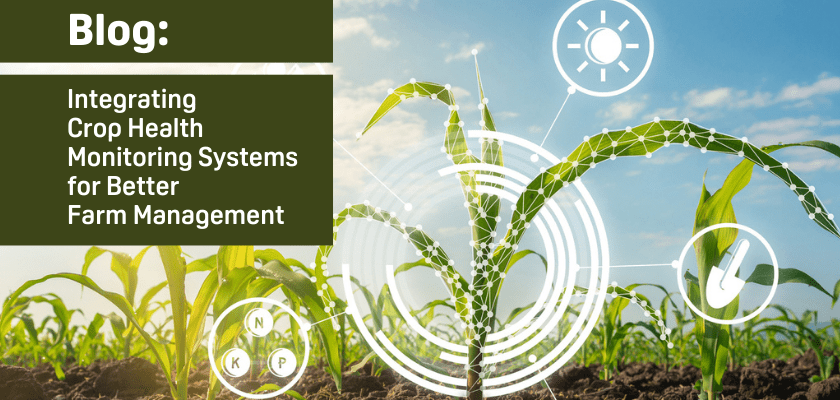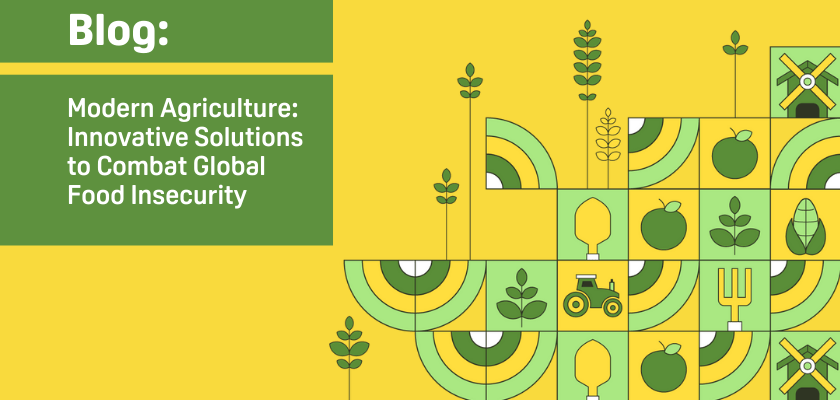

Clean Agriculture: Strategies for Eco-Friendly Farming
Clean agriculture, or eco-friendly farming, involves sustainable practices that emphasize environmental health, economic profitability, and social equity. Key strategies include sustainable soil management, water conservation, integrated pest management, biodiversity enhancement, and renewable energy use. Doktar's innovative solutions, such as Filiz Sensor Stations, PestTrap, Orbit Field Scout, and CropMap, support farmers in adopting clean agriculture practices, promoting long-term productivity and sustainability.
Published on 30 July 2024
What Is Clean Agriculture and Why Is It Important?
Clean agriculture, or eco-friendly farming, refers to sustainable agricultural practices prioritizing environmental health, economic profitability, and social and economic equity. It focuses on minimizing the ecological footprint of farming activities by promoting biodiversity, soil health, and water conservation while reducing the reliance on chemical inputs such as pesticides and fertilizers. This approach is crucial as it addresses the growing concerns about climate change, soil degradation, and water scarcity, ensuring long-term agricultural productivity and food security.
Key Strategies for Eco-Friendly Farming
Eco-friendly farming is essential for creating a sustainable and resilient agricultural system. Farmers can reduce their environmental impact and promote long-term agricultural health by adopting various sustainable practices. Here are some key strategies that can make a significant difference in achieving eco-friendly farming:
1. Sustainable Soil Management
Healthy soil is the foundation of clean agriculture. Sustainable soil management practices include crop rotation, cover cropping, reduced tillage, and organic amendments like compost and manure. These practices enhance soil structure, increase organic matter, and improve nutrient cycling, leading to more resilient crops and reduced need for chemical fertilizers.
2. Water Conservation Techniques
Efficient water use is critical in eco-friendly farming. Techniques such as drip irrigation, rainwater harvesting, and moisture sensors (like Doktar's Filiz sensor stations) help farmers optimize water use. These methods reduce water waste, lower costs, and ensure that crops receive the precise amount of water they need to thrive.
3. Integrated Pest Management (IPM)
IPM combines biological, cultural, mechanical, and chemical tools to manage pests in an environmentally and economically sound manner. By using natural predators, resistant crop varieties, and targeted pesticide applications, farmers can reduce their reliance on chemical pesticides, promoting eco-friendly pest control. Doktar's PestTrap, which uses AI for pest detection, is an excellent tool for implementing IPM effectively.
4. Biodiversity Enhancement
Encouraging farm biodiversity through practices like intercropping, agroforestry, and maintaining natural habitats helps control pests, improve pollination, and enhance soil health. Biodiverse farms are more resilient to environmental changes and pest outbreaks, making them more sustainable in the long run.
5. Renewable Energy Use
Transitioning to renewable energy sources, such as solar or wind power, for farm operations reduces greenhouse gas emissions and dependence on fossil fuels. Renewable energy solutions can make farming operations more sustainable and reduce environmental impact.
How Can Sustainable Practices Benefit Crop Health?
Improved Soil Health
Sustainable practices improve soil structure and fertility, leading to healthier crops. Healthy soil supports robust root systems and provides essential nutrients that enhance plant growth and resistance to diseases and pests. Additionally, these practices help maintain soil moisture levels, reducing the need for frequent irrigation.
Reduced Chemical Residue
Sustainable practices minimize synthetic fertilizers and pesticides, reducing the chemical residue in crops. This benefits human health and supports beneficial insects and microorganisms that contribute to a balanced ecosystem. Furthermore, this approach helps prevent soil and water pollution, promoting a healthier environment.
Enhanced Resilience
Sustainable farming practices increase crops' resilience to extreme weather events and climate change. Practices such as mulching and using drought-resistant crop varieties help crops withstand adverse conditions, ensuring stable yields. These methods also contribute to soil conservation, reducing erosion and maintaining soil health over time.
Organic Farming: Principles and Practices
Organic farming is a key component of clean agriculture. It relies on natural processes and inputs, avoiding synthetic chemicals. Here are some fundamental principles and practices of organic farming:
1. Soil Fertility Management
Organic farmers use compost, green manure, and animal manure to maintain soil fertility. These organic amendments improve soil structure, increase microbial activity, and enhance nutrient availability. Cover cropping is often employed to protect and enrich the soil during the off-season.
2. Crop Diversity
Diverse cropping systems reduce pest and disease pressure, improve soil health, and increase resilience. Organic farmers often use crop rotations and intercropping to enhance biodiversity. This diversity stabilizes ecosystems and improves pollination and natural pest control.
3. Natural Pest Control
Organic farming relies on natural pest control methods, such as biological control agents, botanical pesticides, and cultural practices like crop rotation and habitat enhancement for beneficial insects. These methods help maintain ecological balance and reduce the need for chemical interventions.
4. Genetic Diversity
Using locally adapted and resistant crop varieties enhances resilience to pests and environmental stressors. Organic farmers often select seeds that are well-suited to their specific growing conditions. This genetic diversity helps ensure crop survival and productivity in varying conditions.
5. Certification Standards
Organic farming is regulated by certification standards that ensure adherence to organic principles. Certified organic farms undergo regular inspections to maintain their certification and guarantee that their practices meet established standards. Compliance with these standards helps build consumer trust and market value.
Highlighting Doktar’s Services and Products
Doktar is at the forefront of providing innovative solutions for clean agriculture. Here’s how Doktar’s products contribute to sustainable farming:
Filiz Sensor Stations
Doktar’s Filiz sensor stations monitor soil and weather conditions, providing real-time data for optimizing irrigation, managing disease risk, and making informed spraying decisions. These sensors help farmers use water more efficiently and reduce chemical inputs, supporting sustainable agriculture. The data collected also aids in precision farming, ensuring resources are used optimally.
PestTrap
PestTrap uses AI-powered image recognition to detect and monitor pest populations in real time. This technology enables farmers to implement targeted pest control measures, reducing the need for broad-spectrum pesticides and promoting eco-friendly pest management. PestTrap's early detection capabilities can significantly minimize crop damage and economic losses.
Orbit Field Scout
Orbit offers satellite-based crop monitoring, allowing farmers to detect problematic areas early and take corrective actions. The platform provides insights into crop health, irrigation needs, and yield potential, helping farmers optimize their operations sustainably. Orbit also provides detailed weather forecasts, enabling better planning and risk management.
CropMap
CropMap transforms agricultural data into actionable market insights by detecting field boundaries, crop types, and monitoring harvests. With up to 98% accuracy, CropMap helps farmers make data-driven decisions, optimize their operations, and minimize production costs. This tool also supports traceability and compliance with agricultural standards.
Integrated AI Models
Doktar’s integrated AI models provide customized API services for crop health monitoring, pest and disease management, fertilization, and market intelligence. These AI solutions support precision farming, enhancing sustainability and productivity. The models continuously learn and improve, ensuring up-to-date and accurate recommendations.
Conclusion
Clean agriculture practices are essential for creating a sustainable and resilient food system. By implementing strategies such as sustainable soil management, water conservation, integrated pest management, and biodiversity enhancement, farmers can reduce their environmental impact while ensuring long-term productivity. Doktar’s innovative products and services provide the tools and insights needed to transition to eco-friendly farming, promoting a healthier environment and a more sustainable future for agriculture.

Agriculture Technology and Data-Driven Harvests
The convergence of agriculture technology and data-driven solutions represents the next frontier of innovation in farming. With companies like Doktar leading the way, farmers can leverage these advancements to improve productivity, reduce environmental impact, and secure a more sustainable future for agriculture. Whether through precision agriculture, sustainable agriculture, or cutting-edge smart agriculture technology, the future of farming is bright, and data is at the heart of this transformation. Technology's positive impact on this future should inspire and motivate us all.

Integrating Crop Health Monitoring Systems for Better Farm Management
Crop health monitoring systems revolutionize modern agriculture by enabling real-time insights into plant health, reducing losses, and promoting sustainability. Tools like Doktar’s CropMap and Orbit integrate advanced technologies, empowering farmers with data-driven decisions. By enhancing efficiency and sustainability, these systems are essential for future-proofing agricultural operations.

Modern Agriculture: Innovative Solutions to Combat Global Food Insecurity
Modern agriculture combats global food insecurity with precision agriculture, sustainable practices, and biotechnology. Tools like IoT, automation, and crop innovations optimize resource use, enhance resilience, and ensure stable food supplies. By integrating smart technologies, agribusinesses address challenges like climate change and resource scarcity, paving the way for a sustainable food future.
